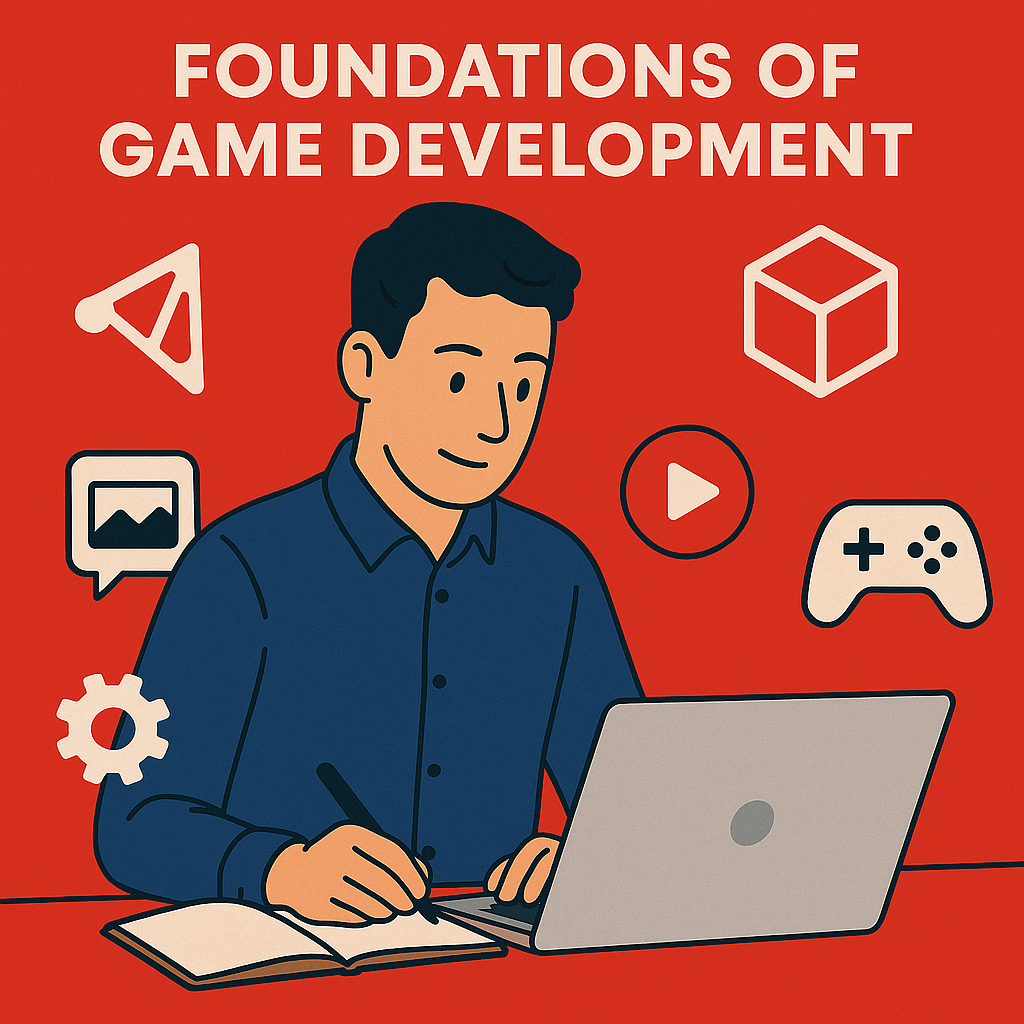Welcome To
Our Game Development Foundations – (Track 1)
This prerequisite track ensures learners build essential programming, storytelling, and game mechanics knowledge before diving into advanced interactive storytelling. It lays a structured foundation in coding, narrative design, and game engine workflows while providing career-ready opportunities such as internships, certifications, and interview prep.
🎮 Course Syllabus
🎭 Stage 1: Core Technical Skills
Chapter 1: Game Engines Overview
- Lesson 1: Unity vs Unreal basics
- Lesson 2: Project setup & deployment
Chapter 2: Programming Essentials
- Lesson 1: C# scripting (Unity)
- Lesson 2: C++ scripting (Unreal)
Chapter 3: Math & Physics for Games
- Lesson 1: Vectors, matrices, transformations
- Lesson 2: Collisions, raycasting, rigidbodies
🎨 Stage 2: Game Design Fundamentals
Chapter 4: Game Design Principles
- Lesson 1: Core loops, mechanics, dynamics
- Lesson 2: Balancing challenge & reward
Chapter 5: Prototyping Methods
- Lesson 1: Paper prototyping
- Lesson 2: Greyboxing in Unity/Unreal
Chapter 6: UI/UX in Games
- Lesson 1: HUDs & menus
- Lesson 2: Player onboarding & accessibility
💬 Stage 3: Collaboration & First Projects
Chapter 7: Version Control & Teamwork
- Lesson 1: Git/GitHub workflows
- Lesson 2: Branching & pull requests
Chapter 8: Mini Projects
- Lesson 1: Build a simple 2D game
- Lesson 2: Create a 3D prototype with a core loop
🎯 Who is This Course For?
✅ Aspiring Game Designers & Writers – Those interested in interactive storytelling, branching narratives, and UI-driven dialogue mechanics.
✅ Beginners in Game Development – Those looking for structured programming fundamentals, scripting basics, and scene setup techniques.
✅ Indie Developers & Storytellers – Those who need a bridge between creative writing and technical implementation in games.
✅ Career Switchers into Tech & Game Dev – Those transitioning into gaming from writing, software development, or design fields.
💡 No Prior Coding Experience? No Problem!
🔹 The course starts with basic programming principles before moving into structured narrative design.
🔹 Hands-on exercises guide learners through interactive storytelling mechanics, even if they’ve never coded before.
🔹 Community forums & peer mentorship ensure support throughout the learning process.
🚀 Program Overview:
💡 Free Certifications:
Unity Certified User (Game Development)
Unreal Academic Partner Program Certification
Narrative Design Certificate (CELTX)
✅ Fundamental Logic & Problem-Solving Skills
- Ability to follow structured sequences (e.g., step-by-step workflows)
- Understanding basic if-then logic (e.g., making decisions in code or game mechanics)
- Ability to break down a problem into smaller steps
✅ Interest in Storytelling & Game Mechanics
- Enthusiasm for game narratives, character development, and player agency
- Understanding basic game elements (e.g., quests, NPC interactions, dialogue systems)
- Willingness to explore interactive storytelling formats like RPGs, adventure games, or visual novels
🚀 Recommended Prerequisite Skills:
✅ Basic Computer Literacy
- Navigating files, directories, and installing software
- Understanding how to use code editors like VS Code, Sublime Text, or Notepad++
- Familiarity with GitHub (optional, but useful for version control)
✅ Internships & Practical Experience – Gain access to internship opportunities with indie studios, collaborative projects, and mentorship.
✅ Industry-Recognized Certifications – Earn game development, programming, and narrative design credentials for portfolio building.
✅ Interview Preparation & Career Guidance – Receive resume building, portfolio coaching, and mock interviews tailored for game industry roles.
✅ Hands-On Projects & Playable Prototypes – Build interactive storytelling mechanics and scripting prototypes in game engines.
✅ Community Forums & Developer Networking – Join forums, Discord groups, and mentorship cohorts to grow alongside other developers.
✅ Flexible Learning Pathway – Self-paced lessons with structured roadmaps for programming, storytelling, and game mechanics.
Before starting the Game Development Foundations – Prerequisite Course, students should have basic familiarity with the following skills to ensure a smooth learning experience. While the course is beginner-friendly, having some foundational knowledge will help learners engage with programming, storytelling, and game mechanics more effectively.
✅ Introduction to Programming (Optional but Helpful)
- Familiarity with basic programming concepts (variables, conditionals, loops)
- Awareness of any scripting language (Python, JavaScript, or even Twine/Ink/Yarn Spinner)
- Understanding that game development involves logic-based decision-making
- ✅ Patience & Problem-Solving Mindset
- Willingness to debug errors and learn from mistakes
- Comfort with trial-and-error problem-solving (game mechanics require iteration)
- Openness to feedback, testing, and refining game designs
📌 Next Steps
Once learners complete this prerequisite track, they’ll be ready for advanced modules in the main curriculum, covering branching dialogue scripting, interactive scene design, narrative pacing, and playable storytelling experiences.

